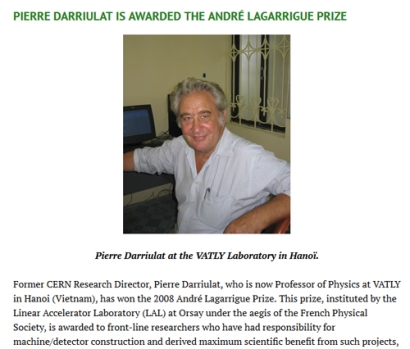Celebrated Physicist Pierre Darriulat Calls UN IPCC Summary ‘Deeply Unscientific’
Celebrated Physicist Calls IPCC Summary ‘Deeply Unscientific’
Former CERN official says 65 prominent IPCC authors have abandoned “scientific rigour.”
click for source
Among the documents recently submitted to a UK Parliamentary committee, a live grenade nestles in the straw.
It was written by a scientific luminary, Pierre Darriulat. For nearly 50 years, his professional life has been devoted to particle physics, nuclear physics, condensed matter physics, and astrophysics. For seven years, he was Director of Research atCERN – one of the world’s largest, most famous, and respected laboratories.
The biography included with his submission tells us that Darriulat was spokesperson for
one of the two experiments that simultaneously discovered the weak bosons and gave evidence for quarks and gluons being produced in the form of hadronic jets.
He is the recipient of prestigious science honours, and advises us that his “scientific work is recognized by the international community.”
Now let us recollect that Al Gore says the climate debate is about “high school physics.” And let us recall that Martin O’Malley, the Governor of Maryland, hassuggested that climate change (by which he means dangerous, human-caused climate change) is scientifically as uncontested as gravity. In his words, “It is physics, pure and simple.”
The implication of this line of argument is clear. If you don’t think climate change is a planetary emergency you’re a dunce – a scientific know-nothing who should keep quiet and accept the judgment of your intellectual superiors.
In light of their public statements, one would expect Messrs Gore and O’Malley to be keenly interested in what a renowned physicist has to say about the recentSummary for Policymakers (SPM) released by the Intergovernmental Panel on Climate Change (IPCC). That’s the document that was drafted by 65 hand-picked IPCC personnel.
Here’s a direct quote from Darriulat’s submission:
The way the SPM deals with uncertainties (e.g. claiming something is 95% certain) is shocking and deeply unscientific. For a scientist, this simple fact is sufficient to throw discredit on the whole summary. The SPM gives the wrong idea that one can quantify precisely our confidence in the [climate] model predictions, which is far from being the case. [bold added]
Darriulat says “the main point to appreciate” is that, because the Summary was written for policymakers rather than for other scientists, it “can not be …
The top seven global warming alarmist setbacks in 2013: ‘The end of 2013 marks the 17th year without global warming’
In honor of the 17th year without global warming, The Daily Caller News Foundation has put together seven setbacks for global warming alarmism.
1) Studies show that the world was warmer than it is today during the Roman Empire and when the Vikings were plundering Europe and North America. In fact, even in the 19th Century, there were discussions surrounding the fact that the Vikings could settle the northernmost reaches of Greenland and North America because there was less ice coverage.
2) During the second week in December, the U.S. saw more than 2000 record low temperatures and record snowfalls, according to the National Weather Service and HamWeather records center. There were 606 record low temperatures, 1,234 low maximum temperatures and 285 record snowfalls across the country. In the meantime there were only 98 high temperature records and 141 high minimum temperature records.
3) Satellite data shows that the polar bears have at least one reason to be happy this year – Arctic sea ice coverage was up 50 percent over last year’s record low coverage. Contrary to Al Gore’s prediction that there would be no polar ice cap by this year, sea ice coverage spanned nearly 2,100 cubic miles by the end of this year’s melting season, up from about 1,400 cubic last year.
4) Global cooling is on the way, according to an increasing number of scientists. German scientists have predicted that based on declining sunspot activity and natural climate oscillation the world will cool over the next century. Temperatures will eventually drop to levels corresponding with the “little ice age” of 1870.
5) Other scientists have also been coming around to the global cooling side of things. The BBC reported that Professor Mike Lockwood of the Reading University predicts that at the current rate of decline in solar activity, another “Little Ice Age” could envelope Northern Europe.
6) The United Nations climate bureaucracy’s latest global warming report was called “hilarious” by a leading scientist from the Massachusetts Institute of Technology. Dr. Richard Lindzen said the UN’s report “has truly sunk to level of hilarious incoherence” because they continue to proclaim with ever greater certainty that mankind is causing global warming, despite their models continually being wrong.
“Their excuse for the absence of warming over the past 17 years is that the heat is hiding in the deep ocean,” Lindzen said. “However, this is simply an …
‘For global warming believers, 2013 was the year from Hell’
…Global Sea Ice Area Expands to Second Highest On Record, And Highest In 25 Years – Closing in on an all-time record
…Report: 2013 Will Finish One Of The Ten Coldest Years In US History, With The Largest Drop In Temperature
…‘Electrified children’: 1911: The Father of global warming Prof. Svante Arrhenius thought exposing children to electricity would make them smarter
…1910: Father of global warming Prof. Svante Arrhenius believed that doubling CO2 would be a good thing
…Scientists losing data at a rapid rate: Decline can mean 80% of data are unavailable after 20 years
In their parents’ attic, in boxes in the garage, or stored on now-defunct floppy disks — these are just some of the inaccessible places in which scientists have admitted to keeping their old research data. Such practices mean that data are being lost to science at a rapid rate, a study has now found.

